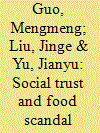| Srl | Item |
| 1 |
ID:
121337


|
|
|
|
|
| Publication |
2013.
|
| Summary/Abstract |
Corporate excessive energy consumption and emissions are negative externality problems, with the basic countermeasure of establishing a series of institutional programs to promote corporate energy conservation and emissions reduction. This paper analyzes the influence of institutional factors such as laws, tax policies, credit policies, government subsidies, media supervision and marketization degree on corporate energy conservation and emissions reduction from the institutional perspective. The data, from 84 listed Chinese chemical and steel companies from 2006 to 2010, was analyzed using both a fixed effect model and the generalized method of moments (GMM) model. The empirical results demonstrate that these institutional factors positively affect corporate energy conservation and emissions reduction. Specifically, four factors - tax policies, government subsidies, credit policies and media supervision - have a significant positive relationship with corporate energy conservation and emissions reduction; whereas laws and marketization degree exhibit no significant effects. The research findings are theoretically and practically significant to the Chinese government with regard to improving the institutional environment and promoting corporate energy conservation and emissions reduction.
|
|
|
|
|
|
|
|
|
|
|
|
|
|
|
|
| 2 |
ID:
182804


|
|
|
|
|
| Summary/Abstract |
Food safety problems are drawing increasing attention after the occurrence of repeated food scandals in China. The literature has found that social trust, a non-institutional factor, is an important factor in disciplining dishonest behaviour and improves the media's incentives to report. In this paper, we develop a model to investigate the dual effects of social trust—behaviour discipline effect and media enhancing effect—and analyse its interplay with institutional factors on food scandal exposure. The theory is then tested using 2004–2011 food event data. The results show that trust has a significant positive impact on food scandal exposure, which implies that the media enhancing effect plays a dominant role in China. However, this effect is weakened in provinces with a higher level of law enforcement and market development, which suggests that institutional factors are a substitute for social trust in affecting food scandal exposure in China.
|
|
|
|
|
|
|
|
|
|
|
|
|
|
|
|